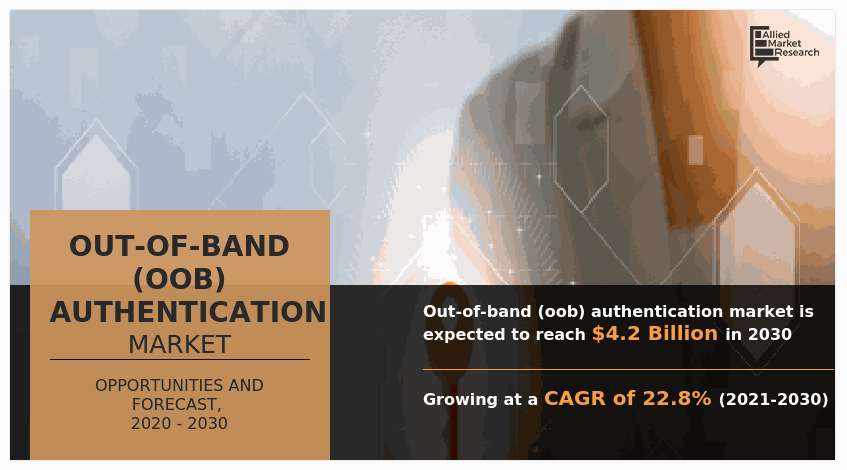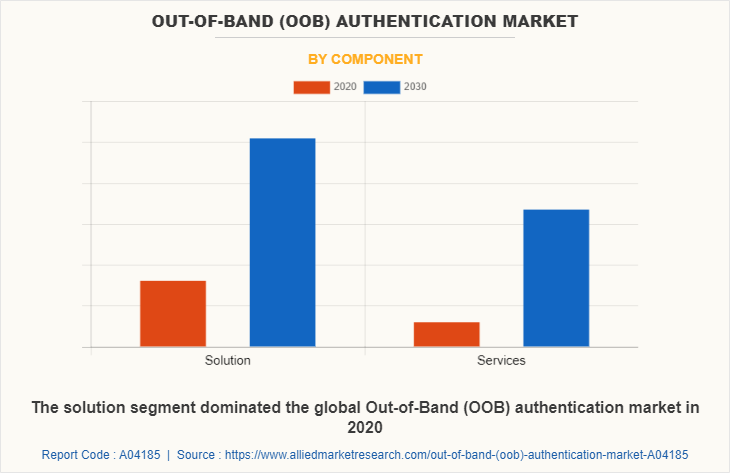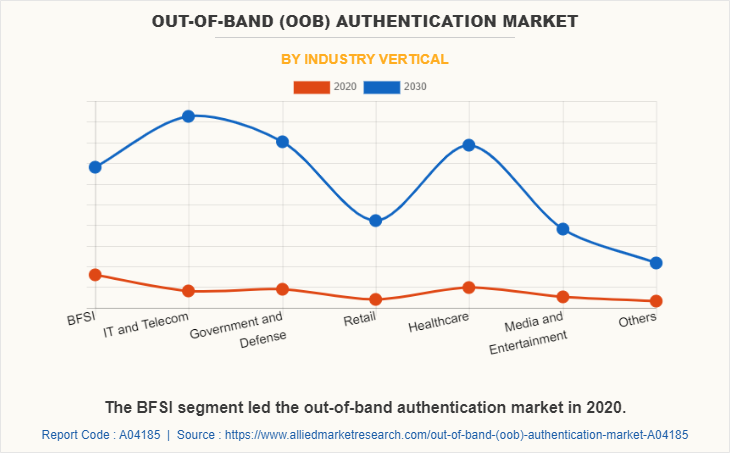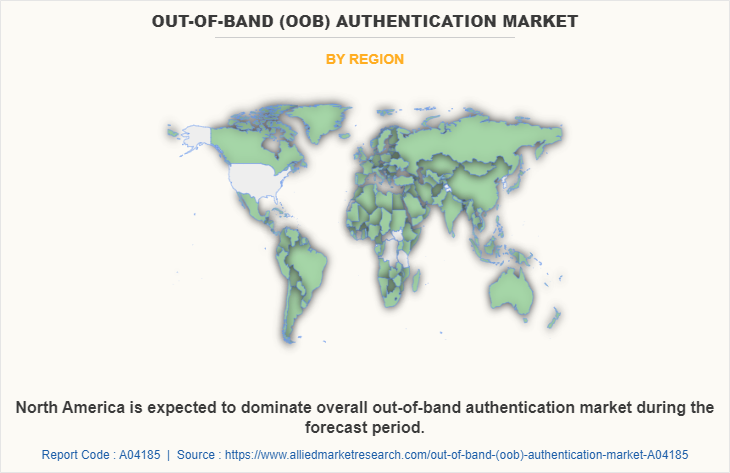Out-of-band (OOB) Authentication Market Statistics, 2030
The global out-of-band (oob) authentication market was valued at $553.45 million in 2020, and is projected to reach $4.2 billion by 2030, growing at a CAGR of 22.8% from 2021 to 2030.
Increase in amount of online transaction in every industry has led to rise in cyber-attacks, which has generated great need of secure transactions. In addition, mobile operators are offering high-speed mobile broadband services to users, which allow them to use mobile transaction features, which, in turn, results in rise in number of online transactions, leading to increase in adoption of out-of-band authentication. Moreover, rise in volume of online transactions, continuous increase in advanced & complex threats, and rise in compliance requirements are some of the major factors that propel growth of the out-of-band authentication market. However, risks included in OOB authentication with SMS and high product association cost restrain the market growth. Conversely, increase in adoption of OOB authentication by small and medium-sized businesses is expected to provide numerous opportunities for the out-of-band authentication market.

Out-of-band authentication is a type of two-factor authentication, which requires a secondary verification method through a separate communication channel along with typical ID and password. Out-of-band authentication is often used in banking and financial institutions as well as in other organizations with high security requirements. Use of OOB authenticators makes hacking an account more difficult because two separate and unconnected authentication channels would have to be compromised for an attacker to gain access.
The report focuses on growth prospects and restraints of the market based on analysis of regional trends. The study provides Porter’s Five Forces analysis of the industry to understand the impact of various factors such as bargaining power of suppliers, competitive intensity of competitors, threat of new entrants, threat of substitutes, and bargaining power of buyers on out-of-band authentication market growth.
Segment Review
The global OOB authentication market is segmented on the basis of component, deployment type, enterprise size, and industry verticals. By component, it is segmented into solution and services. The solution segment is further sub segmented into hardware and software. On the basis of deployment type, it is segmented into on-premise and cloud. By enterprise size, it is segmented into large enterprises and small & medium sized enterprises. On the basis of industry vertical, it is segmented into BFSI, IT & telecom, government & defense, retail, healthcare, media and entertainment and others. Region wise, the market is analyzed across North America, Europe, Asia-Pacific, and LAMEA.

The solution segment dominated the global market in 2020, and is expected to remain dominant during the forecast period, owing to surge in adoption of hardware OOB authenticators among end users.

By industry vertical, the BFSI segment led the market in 2020, and is projected to maintain its dominance in the future. However, the IT & telecom segment is expected to witness highest growth, owing to enforcement of regulations by regulatory authorities related to data security.

North America generated the highest revenue in 2020; however, the Asia-Pacific segment is anticipated to witness fastest growth rate during the out-of-band authentication market analysis.
Some of the dominant players of the global out-of-band authentication industry include CA Technologies (Broadcom Inc.), CensorNet, Deepnet Security, Early Warning Services, LLC, Gemalto N.V. (Thales DIS), SecurEnvoy Ltd., StrikeForce Technologies, Inc., NortonLifeLock, Inc. (Symantec Corporation), TeleSign Corporation, and OneSpan (VASCO Data Security International, Inc.)
Top Impacting Factors
Rise in Volume of Online Transactions
One of the major drivers that contribute toward growth of this market is exponential rise in volume of online transactions. A number of consumers depend on internet for transactions, which has increased frequency of cyberattacks majorly on websites where online transactions are significantly high. Hackers target lucrative sectors that have a huge online customer base. Hence, to counter these cyberattacks, organizations are adopting authentication methods such as phone-based authentication, hardware one-time password (OTP) tokens, software OTP tokens, and others to make online transactions more secure.
Continuous Increase in Advanced & Complex Threats
Frequency and complexity of advanced & complex cyberattacks are continuously increasing. These attacks are targeted at critical installations such as web servers, government departments, customer & password databases, and some of more impressive threats can crash the entire infrastructure of an attacked destination. Simple authentication is not enough to prevent these sophisticated attacks. Thus, multiple companies, governments, and financial institutions are implementing OOB authentication techniques such as hardware OTP token authentication to secure their infrastructure.
Rise in Compliance Requirements
Concerns about data privacy have increased in all industries handling critical data, such as financial services, baking, insurance, payment card, and healthcare sectors. Companies are required to comply with security and privacy requirements set by regulatory authorities and breach in compliance can cause financial loss to the company. This has resulted in increase in adoption of OOB authentication methods.
Surge in Adoption of OOB Authentication by SME Businesses
Emergence of bring your own device (BYOD) trend in organizations is anticipated to create numerous opportunities for the market growth. Use of mobile devices and tablets to access critical information is continuously increasing, which has generated the need for security solutions. As these mobile devices and tablets are not secure, there are high chances of fraudulent activities and misuse of critical corporate and business data. Thus, many enterprises are increasingly adopting OOB authentication to secure their networks from growing security threats.
COVID-19 Impact Analysis
The COVID-19 pandemic had a huge impact on all the industry verticals as most of the enterprises adopted work from home and financial institutions went online. Hence, the chances of online fraud and unauthorized access into the systems increased during the pandemic. In order to stay protected from such online frauds and data theft issues, adoption of out-of-band authorization increased, since this type of sophisticated authentication system is used to provide extra protection against unauthorized access and confirmations, and prevents many frauds and hacking. It effectively blocks many kinds of hacking and identifies thefts in online banking. Thus, the out-of-band authentication industry was positively impacted by the COVID-19 pandemic.
Key Benefits for Stakeholders
- The study provides in-depth analysis of the global out-of-band authentication market share along with current & future trends to illustrate the imminent investment pockets for the global out-of-band authentication market analysis.
- The market research is offered along with information related to key drivers, restraints, and opportunities.
- Porter's five forces analysis highlights the potency of buyers and suppliers to enable stakeholders make profit-oriented business decisions and strengthen their supplier-buyer network.
- In-depth analysis of the out-of-band (oob) authentication market forecast segmentation assists to determine the prevailing market opportunities.
- Major countries in each region are mapped according to their revenue contribution to the global out-of-band market size.
- Market player positioning facilitates benchmarking and provides a clear understanding of the present position of the market players.
- The report includes global out-of-band (oob) authentication market analysis at regional and country level as well as market trends, key players, market segments, application areas, and market growth strategies.
Out-of-band (OOB) Authentication Market Report Highlights
| Aspects | Details |
| By Component |
|
| By Deployment Type |
|
| By Enterprise Size |
|
| By Industry Vertical |
|
| By Region |
|
| Key Market Players | Deepnet Security, OneSpan (VASCO Data Security International, Inc.), SecurEnvoy Ltd., Gemalto N.V. (Thales DIS), TeleSign Corporation, CensorNet, CA Technologies (Broadcom Inc.), NortonLifeLock, Inc. (Symantec Corporation), StrikeForce Technologies, Inc., Early Warning Services, LLC |
Analyst Review
Out-of-band authentication is a two-factor authentication process, which requires a secondary verification method through a separate communication channel along with typical ID and password. It is often used in banking and financial institutions as well as in other organizations with high security requirements. Use of out-of-band authenticators makes hacking an account more difficult as two separate and unconnected authentication channels would have to be hacked for an attacker to gain access. In addition, continuous rise in online transactions, owing to which a number of organizations have started using authentication techniques such as hardware OTP tokens, e-mail, and phone-based authentication methods to make online transactions more secure, which drives growth of the market. Furthermore, availability of 3G and 4G devices results in rise in online transactions and increase in bring your own device (BYOD) trend in many organization fuel adoption of out-of-band authentication systems.
Moreover, emergence of next-generation hardware OTP tokens and increase in adoption of out-of-band authentication among small & medium-sized enterprises are expected to provide potential growth opportunities for the market. Some key players operating in the market that are profiled in the report include CA Technologies (Broadcom Inc.), CensorNet, Deepnet Security, Early Warning Services, LLC, Gemalto N.V. (Thales DIS), SecurEnvoy Ltd., StrikeForce Technologies, Inc., NortonLifeLock, Inc. (Symantec Corporation), TeleSign Corporation, and OpenSpan (VASCO Data Security International, Inc. The market players have adopted various growth strategies to enhance their product portfolio and market penetration, as well as they are launching new products to increase their customer base and to cater to growing demands for consumers. For instance, TeleSign launched TeleSign Smart Verify, which is a new unified API that simplifies end-user verification and two-factor authentication (2FA) for online and mobile app-based accounts to help prevent fraud and stop account compromise.
Emergence of next-generation hardware OTP tokens and increase in adoption of out-of-band authentication among small & medium-sized enterprises are expected to drive the growth of the market.
North America is expected to dominate overall out-of-band authentication market during the forecast period as it is the highest adopter of authentication software and services.
The global out-of-band authentication market size is projected to reach $4,215.06 million by 2030.
The market size of Out-of-Band (OOB) authentication market was $553.45 million in 2016.
Some of the dominant players of the global out-of-band authentication market include CA Technologies (Broadcom Inc.), CensorNet, Deepnet Security, Early Warning Services, LLC, Gemalto N.V. (Thales DIS), SecurEnvoy Ltd., StrikeForce Technologies, Inc., NortonLifeLock, Inc. (Symantec Corporation), TeleSign Corporation, and OneSpan (VASCO Data Security International, Inc.)
Loading Table Of Content...



